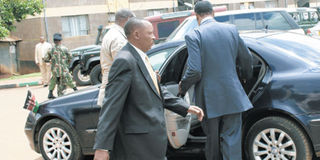Ministers biggest losers in spending cuts

Government vehicles found on the roads after office hours will be impounded, according to a new Treasury circular. PHOTO/ WILLIAM OERI | NATION
What you need to know:
- Treasury imposes travel restrictions, freezes recruitment and demands budget curbs on advertisement in fresh attempt to save money for priority national projects
Ministers and senior public servants using their official vehicles to run personal errands should beware. The cars will be impounded and the officers surcharged for abuse of office, according to new measures to check government spending.
Recruitment of staff has been temporarily stopped as is the purchase of furniture, computers and other office equipment.
Under the new expenditure control measures meant to free more money for basic services, training of civil servants and other public officials in foreign countries has been banned.
Finance permanent secretary Joseph Kinyua announced the measures in a circular dated December 22, 2011. He ordered the impounding of government vehicles found on the roads before 8am and after 5pm and on weekends.
Ministers, assistant ministers and permanent secretaries would be allowed to use their official vehicles on weekends only when on official duty.
Mr Kinyua directed the Government Vehicle Check Unit to impound vehicles being used outside official working hours without necessary authority. Drivers and officers who contravene the directive will be surcharged.
The order comes less than a year after the government awarded civil servants commuter allowances.
The aim was to reduce the cost of transport and related expenses of picking up and dropping off officers entitled to official transport.
Spotted on the roads
“Contrary to this, there is a general increase in the number of government vehicles spotted on the roads,” Mr Kinyua warned. “Any officer receiving commuter allowance and continues to use government transport outside official working hours will be surcharged and lose equivalent of one month’s allowances.”
In the Commitment and Expenditure Control Measures circular, Mr Kinyua announced that ministerial delegations abroad shall not exceed five people. Delegations led by permanent secretaries or parastatal chiefs will not exceed three members.
All other government officials travelling abroad will fly economy class, except ministers, permanent secretaries and parastatal bosses.
Mr Kinyua banned domestic travel and related expenditures.
“We have noted instances where officers arrange for domestic travel and accommodation from one town to another for the purpose of discussing strategy documents, consultants’ reports or even other assignments that would ordinarily be done in the office.
“Such expenditures are hard to justify and should be discouraged at all times,” he said.
Also banned are breakfast meetings organised in hotels and funded by the Exchequer. The Treasury chief directed officers from ministry headquarters to delegate field activities such as official opening of workshops to those in counties to cut on trips.
From the next financial year, Mr Kinyua said, ministries would be banned from spending money on publicity materials such as Christmas cards, calendars, T-shirts and caps.
Their cost is said to have gone up substantially over the last three years. Only the Tourism ministry will be allowed to print calendars on behalf of the government.
Mr Kinyua directed ministries and departments to post most of their advertisements on their websites to cut down expenditure on media supplements. He said the government had invested heavily on information and communication technology and related services to lower the costs of communication.
For the first time, Mr Kinyua spoke on the controversial millions of shillings spent on donor projects in a manner described as “ineligible”.
Recent audits of donor-funded projects, he said, had revealed that some ministries incurred expenditure without seeking prior approval.
“Any commitment of expenditure contrary to the financing agreement between the government and development partners is considered as ineligible and often perceived as misappropriation of funds,” Mr Kinyua said.
“Accounting officers are directed to ensure their staff responsible for implementing various development programmes and projects fully comply with the spending conditions embedded in the financing agreements.
“Failure to comply with this directive will lead to disciplinary action against the concerned officer and even the accounting officer.”
The government is to reimburse more than Sh2 billion to donors after the money was misappropriated in the free learning programme and the Arid Lands Resource Management Programme, among others.
According to the circular, there will be no reallocations or additional funding on the items covered under the new austerity measures.
The PS said the measures were forced upon the country due to high inflation. The situation was worsened by the high food prices and deteriorating global economic conditions that weakened the prospects of faster economic growth in the year.
“The high inflation and weaker shilling have added more pressure on the government expenditure, particularly repayment of external public debt in shilling terms which has substantially increased.”
The circular was sent to Head of Public Service Francis Muthaura, Controller of Budget Agnes Odhiambo, Auditor General Edward Ouko and Police Commissioner Mathew Iteere.



